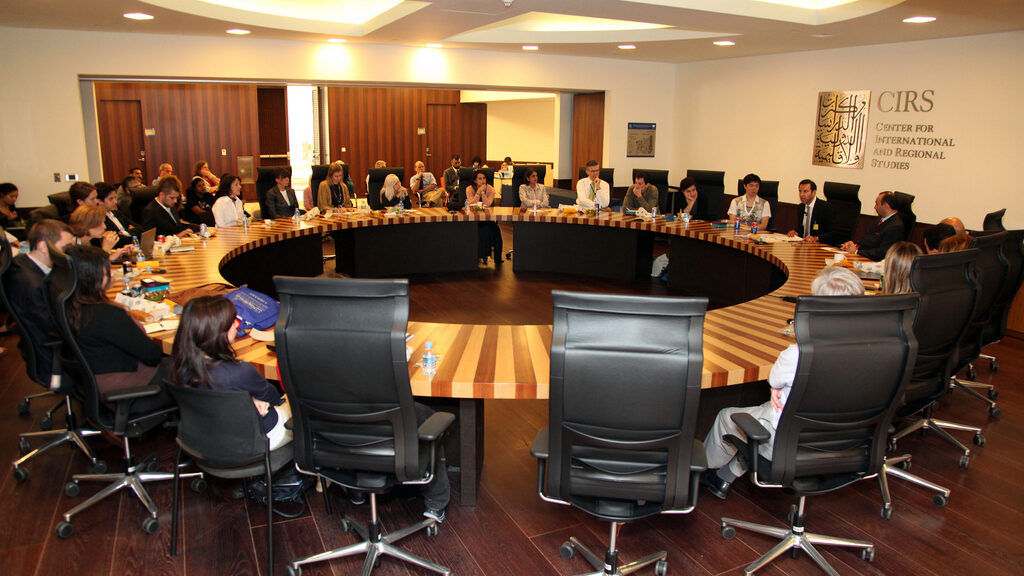Salman Shaikh of Brookings Doha Center Speaks on Libya and the International Community at Georgetown University Event

Georgetown University School of Foreign Service in Qatar (SFS-Qatar) today hosted Salman Shaikh in a luncheon talk sponsored by Georgetown’s Center for International and Regional Studies (CIRS). Salman Shaikh, the Director of the Brookings Doha Center and a fellow at the Saban Center for Middle East Policy, was invited to speak at SFS-Qatar in the first CIRS event of the 2011-2012 academic calendar. He spoke on the role that the international community has played in Libya during the revolution and the opportunities for further involvement from the international community going forward.
“The events in Libya provide a number of significant lessons for the international community in a changing Arab world,” said Shaikh.
“They show us the importance of moving with international legality, which was not pursued satisfactorily in Iraq, and they help make the case for international intervention in times when overwhelming force and egregious human rights violations are being committed by a regime. The case of Libya also helps us understand that national sovereignty does not belong only to the government, it also belongs to the people.”
The event was held in the CIRS conference room, where more than 40 members of the Georgetown community gathered to discuss Shaikh’s latest analysis of the situation in Libya.
During his presentation, titled “Libya and the International Community: The Way Forward,” Shaikh examined the role that the international community has played in Libya since February, and discussed areas where Libya could benefit from international assistance in the country’s transition following the revolution.
Shaikh began his lecture by reviewing key dates in the Libya revolution and in international involvement in Libya over past months, discussing roles played by NATO, the United Nations and the African Union, as well as the Arab League and the GCC in particular. Discussing the various elements that made international intervention effective in Libya, Shaikh alluded to possible implications for the situation in Syria. He also discussed domestic and regional opportunities for international assistance to Libya, including assistance in security and the demobilization of fighters, the reconciliation process, constitutional transformation, transitional justice, socioeconomic development and regional preventive diplomacy.
“Libya’s future is rosier than other countries,” commented Shaikh, “I’m fairly hopeful that the National Transitional Council (NTC) will manage to work through its timetable and we’ll see a genuine transition to a sustainable and viable alternative political system in Libya.”
Other topics covered during the lecture included the responses of Russia and China to the situation in Libya and international concern over the rise of Islamic extremism in what has been termed “the Arab awakening.”
“Thank you very much for joining us here today Salman, you’ve given us much food for thought. We look forward to having you share more of your insights with us going forward,” said Mehran Kamrava, who moderated the subsequent discussion and serves as director of CIRS.
Salman Shaikh focuses on mediation and conflict resolution issues facing the Middle East and South Asia. He has held posts at the United Nations and the Office of Her Highness Sheikha Mozah Bint Nasser Al Missned in Qatar. He also held the position of special representative in Europe to the Muslim West Fact Initiative.
Georgetown University’s CIRS hosts a variety of regional and international experts, with former speakers including prominent Middle East news correspondent Robert Fisk and Pulitzer Prize-winning author Thomas L. Friedman. These lectures are designed to raise awareness of regionally-relevant international issues.
Georgetown’s Center for International and Regional Studies in Qatar is a premier research institute devoted to the academic study of regional and international issues. CIRS sponsors a number of forums throughout the year facilitating dialogue and an exchange of ideas on a broad range of issues with the aim to engage and enrich the university students and community.